Date: Thursday, 15 December 2016
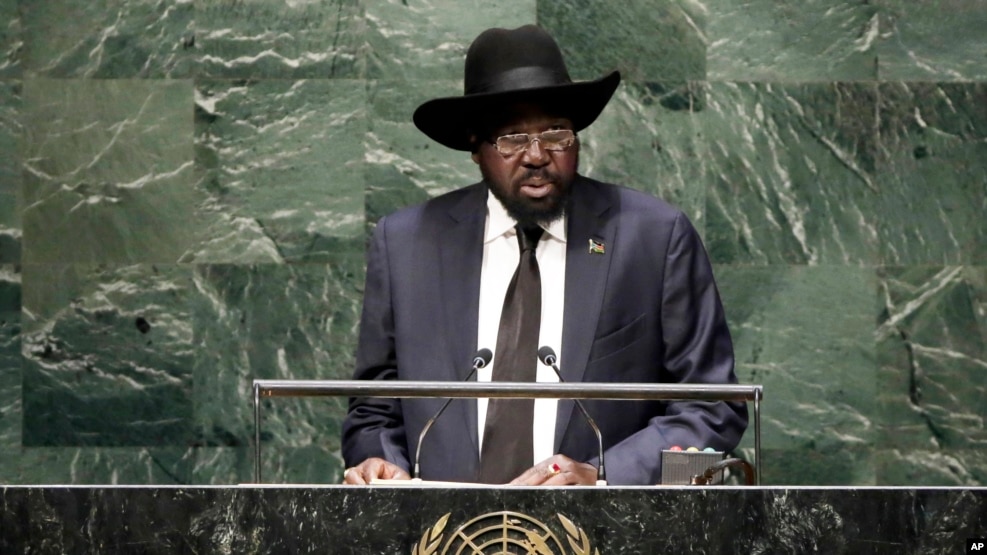
FILE - President Salva Kiir, of South Sudan, addresses the 69th session of the United Nations General Assembly, at U.N. headquarters, Sept. 27, 2014.
President Salva Kiir has asked the South Sudanese to forgive him for past mistakes. The president made the appeal Wednesday during an end-of-year speech before the National Legislative Assembly. He also ordered government forces to observe a cease-fire and create a conducive environment for communities to reconcile.
"In the spirit of national unity, forgiveness and dialogue, I am asking you, the people of South Sudan, to forgive me for any mistakes I might have committed. This is a spirit that our country needs and we must act now," Kiir said.
The president called for a national dialogue, one that he said would include people from all sectors of society, as the three-year conflict drags on in parts of the country.
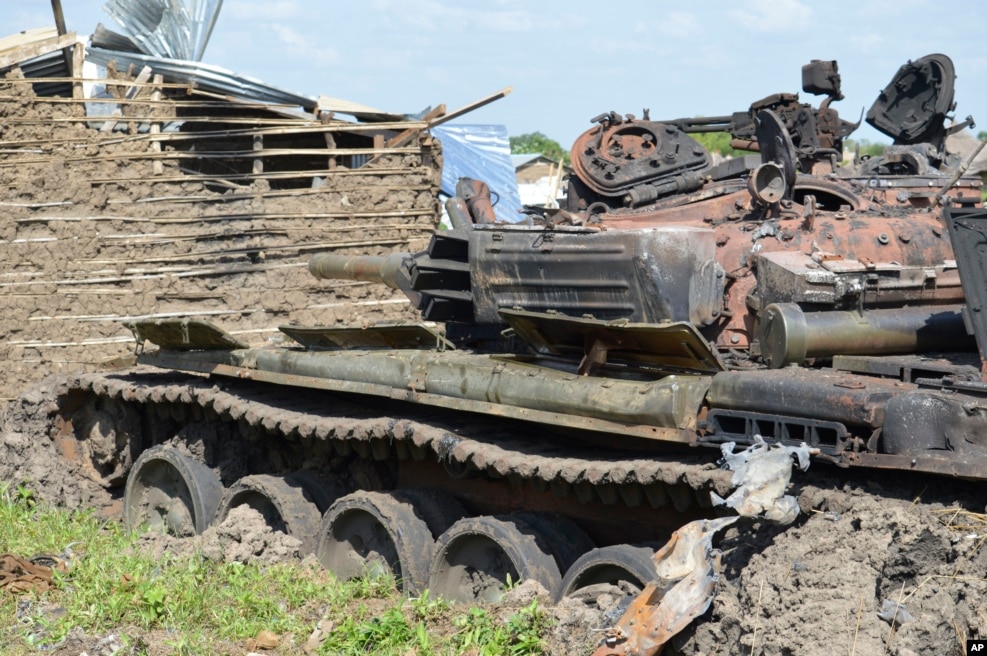
FILE - Tanks that have been destroyed during fighting between forces of Salva Kiir and Riek Machar, July 10, 2016 in Jabel area of Juba, South Sudan, July 16, 2016.
"I strongly believe that the current situation in our country calls for a national dialogue,” he said. “It calls for unity and to end the cycle of violence and atrocities. A national dialogue, in my view, is both a forum and a process through which the people of South Sudan can gather to redefine the basis of their unity as it relates to nationhood, citizenship and a sense of belonging."
Kiir added the dialogue will allow citizens to discuss openly how South Sudan should be structured and what its development priorities should be. He said the government will ensure that the outcome of a national dialogue will be accepted by all, and implemented.
Grass-roots involvement
"The government will not lead or control this process,” he said. “The government shall be a stakeholder in the national dialogue. I strongly believe in a South Sudanese-led process, and so we have identified our fellow citizens who are persons of consensus and integrity to steer this process."
He did not elaborate on who selected the "persons of consensus and integrity" to run the national dialogue. Nor did he name the people steering the process.
At the same time, Kiir insisted the process would involve grass-roots consultations, regional peace conferences and a national conference in Juba.
Faith-based groups and local think tanks — including the Sudd Institute, the Ebony Center for Strategic Studies, and the Center for Peace and Development Studies — are to be involved in the planning process, according to the president.
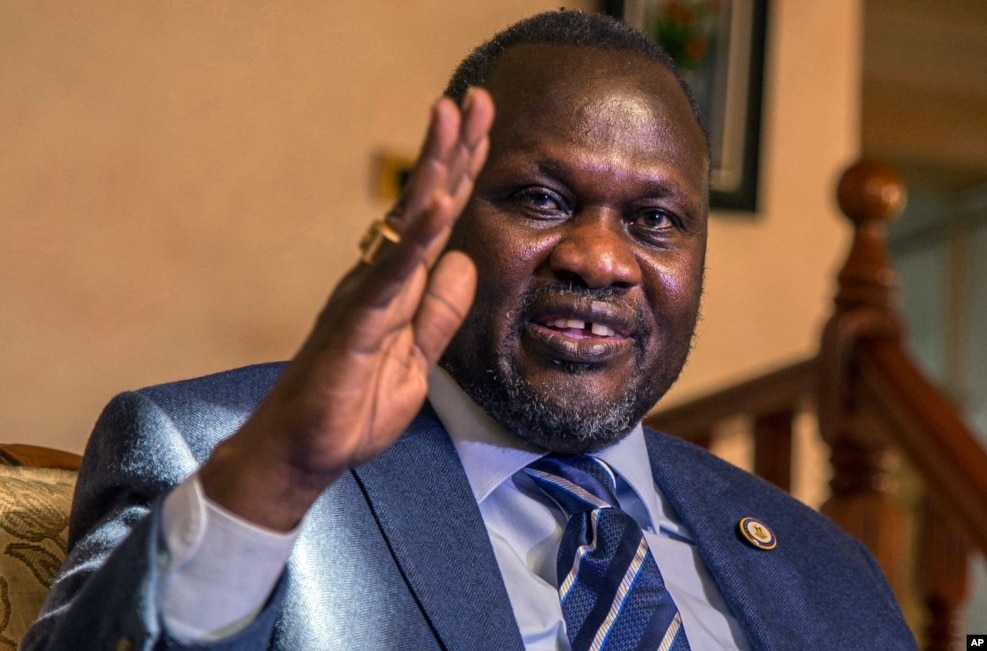
FILE — South Sudan rebel leader Riek Machar talks to reporters in Addis Ababa, Ethiopia, Feb. 13, 2016.
Kiir: Safety for all
Without mentioning by name his former First Vice President Riek Machar, who has been run out of the country, Kiir said the government will guarantee the safety and freedom of all who participate in the dialogue, including those outside the country who oppose his government.
"I call upon those who are still carrying arms to stop destroying their own homes and their own country and join the process of national dialogue,” he said. “I also call upon our national army and all the security organs to uphold their constitutional mandate to protect all the citizens and their properties."
Kiir promised that "no grievances will be left unaddressed in this process."
The president also warned against hate speech, saying his government will take serious measures against individuals who promote ethnic hatred and violence.
"I also call upon those propagating hate speeches in the social media, international and social forums to stop tearing their country and communities apart," he said.
Kiir instructed the South Sudanese people to "stop any propaganda against the international community, especially the American people and the United Nations."
********************************************************************************
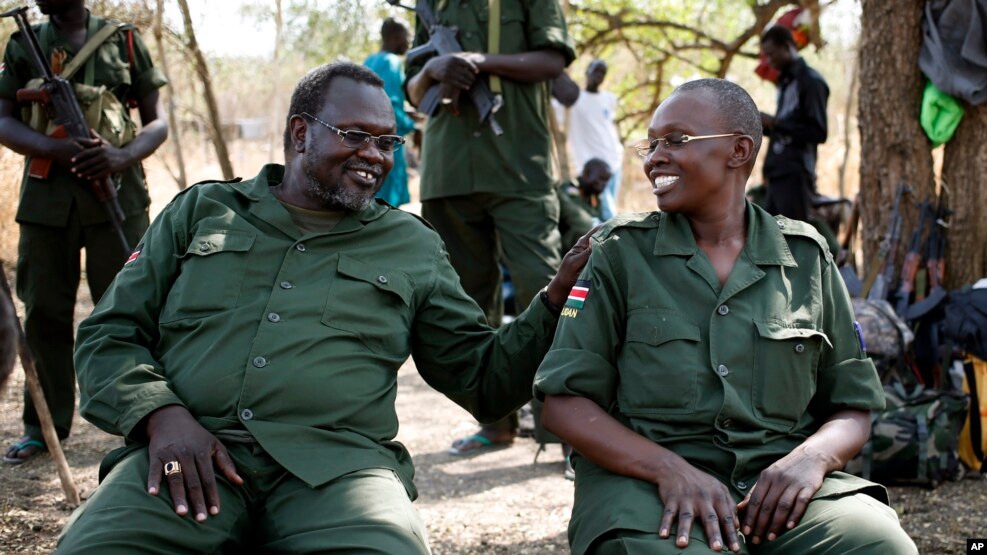
FILE - South Sudan's rebel leader Riek Machar (L) and his wife Angelina Teny joke in front of their tent in a rebel-controlled area in Jonglei State, South Sudan, Jan. 31, 2014.
The wife of South Sudanese rebel leader Riek Machar says a 2015 deal to end the country's conflict can be "resuscitated" if the sides move to review and possibly change the agreement.
Angelina Teny, a member of the SPLA-In-Opposition's political bureau, is in Washington this week to meet with members of the diaspora, analysts and policy makers.
Speaking to VOA's "South Sudan in Focus" program, Teny said African countries have “taken a side” in the conflict between President Salva Kiir's government and the opposition.
She said this leaves no space for a political process that reviews the 2015 peace deal, including the ceasefire arrangements and the transitional security arrangements.
“We have been saying that there is still a chance for this agreement to be resuscitated but there is a need for a political process in order to bring back the agreement,” she said.
“And this political process, there is need to create that environment so that this agreement also itself is reviewed. What is it that went wrong? What is it that didn’t work ...?” asked Teny.
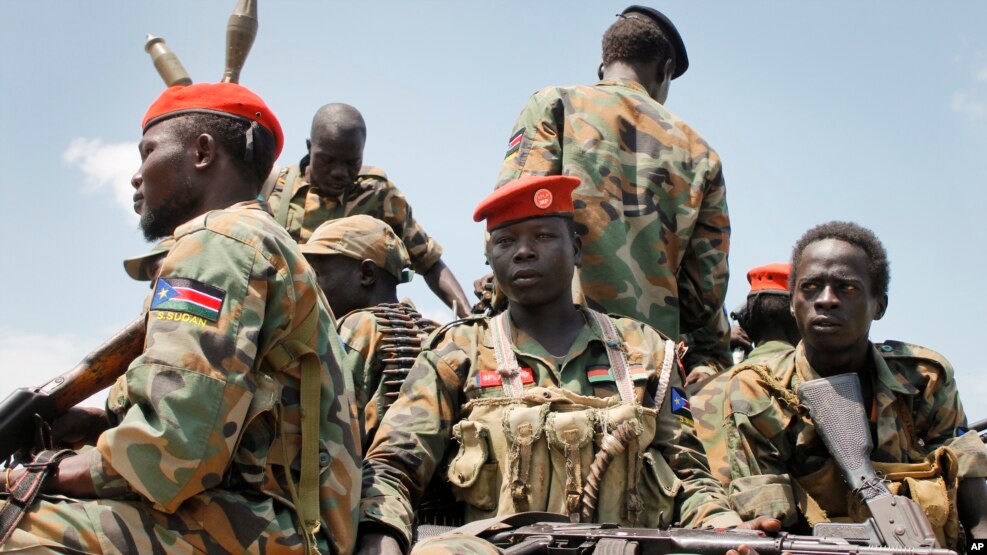
FILE - A group of South Sudanese government soldiers sit on the back of a pickup truck in Malakal, South Sudan, Oct. 16, 2016. Angelina Teny, wife of South Sudan rebel leader Riek Machar says, the “politics of isolation” are working against the interest of peace in her country.
‘Politics of isolation’
Riek Machar, former first vice president and husband of Teny, fled South Sudan after fighting broke out in Juba in July. Teny fled the country at the same time.
Machar went to the Democratic Republic of Congo, then to Sudan and most recently South Africa for medical treatment.
Teny says Machar is residing in South Africa on a visa that is valid until the end of January. She referred questions about the circumstances regarding his stay in the country to South African officials.
In an emailed statement Wednesday, South Africa’s department of International Relations and Cooperation said its government is “taking care of [Machar]” and is committed to working in the interest of peace with the government and people of South Sudan.
In her first interview since violence erupted in Juba, Teny said the “politics of isolation” are working against the interest of peace.
She said this month’s assembly summit of the regional bloc IGAD “totally ignored that there is another party called IO and implies that IO is Taban.”
Taban is Taban Deng Gai, who replaced Machar as South Sudan's first vice president. She downplayed the role and influence of the new VP, saying the war has not stopped on his watch.
“In fact, the war has escalated even worse,” said Teny.